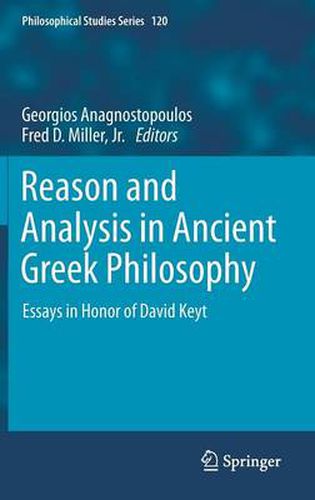Readings Newsletter
Become a Readings Member to make your shopping experience even easier.
Sign in or sign up for free!
You’re not far away from qualifying for FREE standard shipping within Australia
You’ve qualified for FREE standard shipping within Australia
The cart is loading…






This title is printed to order. This book may have been self-published. If so, we cannot guarantee the quality of the content. In the main most books will have gone through the editing process however some may not. We therefore suggest that you be aware of this before ordering this book. If in doubt check either the author or publisher’s details as we are unable to accept any returns unless they are faulty. Please contact us if you have any questions.
This distinctive collection of original articles features contributions from many of the leading scholars of ancient Greek philosophy. They explore the concept of reason and the method of analysis and the central role they play in the philosophies of Socrates, Plato, and Aristotle.
They engage with salient themes in metaphysics, epistemology, ethics, and political theory, as well as tracing links between each thinker’s ideas on selected topics.
The volume contains analyses of Plato’s Socrates, focusing on his views of moral psychology, the obligation to obey the law, the foundations of politics, justice and retribution, and Socratic virtue. On Plato’s Republic, the discussions cover the relationship between politics and philosophy, the primacy of reason over the soul’s non-rational capacities, the analogy of the city and the soul, and our responsibility for choosing how we live our own lives. The anthology also probes Plato’s analysis of logos (reason or language) which underlies his philosophy including the theory of forms. A quartet of reflections explores Aristotelian themes including the connections between knowledge and belief, the nature of essence and function, and his theories of virtue and grace.
The volume concludes with an insightful intellectual memoir by David Keyt which charts the rise of analytic classical scholarship in the past century and along the way provides entertaining anecdotes involving major figures in modern academic philosophy. Blending academic authority with creative flair and demonstrating the continuing interest of ancient Greek philosophy, this book will be a valuable addition to the libraries of all those studying and researching the origins of Western philosophy.
$9.00 standard shipping within Australia
FREE standard shipping within Australia for orders over $100.00
Express & International shipping calculated at checkout
This title is printed to order. This book may have been self-published. If so, we cannot guarantee the quality of the content. In the main most books will have gone through the editing process however some may not. We therefore suggest that you be aware of this before ordering this book. If in doubt check either the author or publisher’s details as we are unable to accept any returns unless they are faulty. Please contact us if you have any questions.
This distinctive collection of original articles features contributions from many of the leading scholars of ancient Greek philosophy. They explore the concept of reason and the method of analysis and the central role they play in the philosophies of Socrates, Plato, and Aristotle.
They engage with salient themes in metaphysics, epistemology, ethics, and political theory, as well as tracing links between each thinker’s ideas on selected topics.
The volume contains analyses of Plato’s Socrates, focusing on his views of moral psychology, the obligation to obey the law, the foundations of politics, justice and retribution, and Socratic virtue. On Plato’s Republic, the discussions cover the relationship between politics and philosophy, the primacy of reason over the soul’s non-rational capacities, the analogy of the city and the soul, and our responsibility for choosing how we live our own lives. The anthology also probes Plato’s analysis of logos (reason or language) which underlies his philosophy including the theory of forms. A quartet of reflections explores Aristotelian themes including the connections between knowledge and belief, the nature of essence and function, and his theories of virtue and grace.
The volume concludes with an insightful intellectual memoir by David Keyt which charts the rise of analytic classical scholarship in the past century and along the way provides entertaining anecdotes involving major figures in modern academic philosophy. Blending academic authority with creative flair and demonstrating the continuing interest of ancient Greek philosophy, this book will be a valuable addition to the libraries of all those studying and researching the origins of Western philosophy.